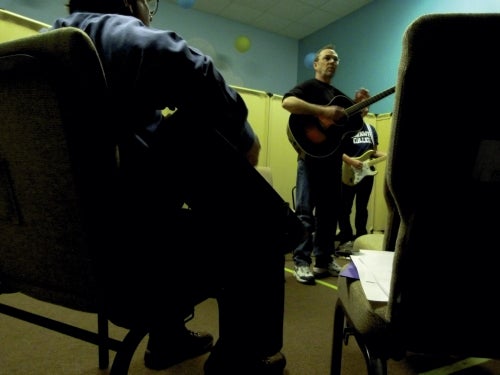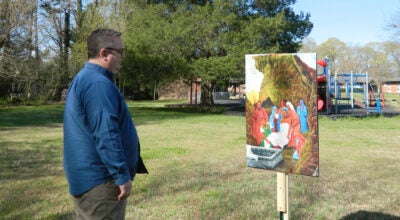The Heart of Worship
Published 12:00 am Saturday, May 9, 2015

- Sandy Hoffman keeps things interesting during his session on tips for worship teams.
By Rebecca Rider for the Salisbury Post
The church has changed drastically in recent years, Director of Sacred Music at Catawba Julie Chamberlain says. And worship has changed — from choirs and organs to rock bands. Catawba College’s new Worship Arts major is a response to this change, she says, and seeks to help students who want to lead worship in a more modern setting.
“I think we put together a curriculum that is distinctive and relevant to today’s church,” Chamberlain said.
But worship, as a concept, is still full of debate. How much is too much? How traditional is too stuffy? Catawba’s Worship Arts conference hosted at Life Church in Salisbury on April 24 and 25 aimed to help new students and longtime pastors navigate the waters of debate and remind them about the true heart of worship.
The conference opened with a night of worship featuring the Catawba Praise Band and guest artist Sandy Hoffman, a Salisbury native, on Friday, April 24. The next morning, participants — ranging from Catawba Worship Arts students to local worship pastors to curious church-goers — gathered in the auditorium at Life Church for a day of learning.
In the opening session, Hoffman, who has trained worship teams at home and abroad and worked as a worship leader for more than 30 years, gave tips for worship teams to playing in synch and becoming effective leaders.
Excellent worship teams, Hoffman says, do two things well. And surprisingly, neither one of them is musical skill, necessarily.
“Skill goes far beyond that,” Hoffman said.
Good worship teams must work well, relationally. They get along, with each other and with their congregation. They know how to interact with their pastor and they know how to lead.
The second thing that makes a good worship team is that they must be good worshipers themselves. You can’t lead people somewhere you’ve never been, Hoffman says. Good worship teams are sincere about their life with God. And while it’s ok, and even encouraged, to improvise, they plan out the worship time with a goal in mind. And when they go on stage they are prepared — they know the music and they know where it will take the congregation.
“We have to begin with the end in mind,” Hoffman said.
After the opening session participants broke off, choosing to learn guitar from Hoffman, attend creative planning sessions, or attend more tips and tricks sessions. In his session, “Praise Band Basics,” Life Church Worship Pastor John Kelp shared more tips about what it means to be a worship leader.
“Worship at its most foundational element is expressing love to God.” Kelp said.
To Kelp, dedication is more important than skill. Every member of a worship team is a worship leader, and needs to be striving to be the best that they can be.
“I don’t think you have to be the greatest musician in the world to be a worship leader,” Kelp said, “But you should strive to be.”
This contributes to a seamless worship experience, and also ensures that the congregation isn’t distracted during worship. Because people pay attention to what they know, Kelp says. Musicians in the congregation will pay attention to the musicians on stage: vocalists will focus on singers, drummers on the drummer, pianist on the keyboard, etc. If these team members aren’t playing to the best of their ability, or aren’t worshipping, those members of the congregation aren’t, either.
Kelp says that a worship pastor should look for people who have the best heart, the passion for it, and the ability to lead in worship above being an excellent musician. It’s better to have someone who is dedicated and determined than to have a good musician who lacks the drive — you’re better off playing by yourself than choosing someone who is half-hearted, Kelp says.
And of course, practice makes perfect. Don’t show up to rehearsals expecting to practice — you should already know the song by heart.
“The more you practice, the more you prepare, the better you’ll be able to lead your people,” Kelp said.
In the Creative Planning sessions, Associate Pastor of Concord First Assembly Church, Steve Hargett spoke about making worship an accessible and creative experience. Make sure that the congregation can track with you, Hargett says. Leading worship is not about the band, it is about leading the congregation into the presence of God — they should be able to make it there uninhibited. And sometimes, that means adding creative elements. Not everyone can sing. They may dance, they may be a writer or an actor. And at its heart worship is creative expression — there should be times in worship for people to express themselves creatively in their own way. Having moments for those talents in worship lets the congregation know that “This creative talent is ok,” Hargett says.
He cautioned worship leaders to be mindful of the pastor — find out what their views on worship are, if they want traditional or contemporary music, if they want it to match the sermon. Always respect your pastors wishes first. And don’t go crazy with technology.
“You can be creative within those boundaries,” Hargett said.
Other sessions included a panel debate with local worship pastors on contemporary versus traditional worship, worship guitar lessons, and techno tips for worship bands.
There are numerous free apps and tools that a worship team, even a traditional one, can make use of. From wireless packs to help even out sound, help musicians communicate to each other on stage, or provide tempo, to looping equipment, prerecorded tracks, and planning software. Many apps are free, or there are free versions available. It helps worship flow seamlessly, and prevents hiccups.
“It’s still authentic — it’s all led from the stage,” Kelp said.
And conference attendees responded to the advice and planning sessions eagerly, ready to take the information and put it to good use.
Lisa Webb, mother of two and worship leader at NorthGate church says she attended the conference to gain more insight on worship and to learn tools her own team could implement. She appreciated the practical, immediate advice she’d received. She was excited about the growth she would experience, and how she could pass on this information to others.
“This isn’t the end,” she said.
Qui Qui Smith is a senior at Catawba College, a Popular Music and Music Business major and a Worship arts Minor, and she loves the program and the conference. She became a Christian in the spring semester of her freshman year at Catawba, but says that she always felt a calling to the worship arts. It’s her passion.
“My music is always from my heart,” she said.
She’s part of Catawba’s Praise Band, and isn’t currently on staff with a worship team at a church, but she thinks that having the information will help a lot later on. It’s helped her realize the purpose of the whole thing, she says, why she wants to do worship, why she chose it. After the conference, she says, she’s ready to go on a new journey.
“I just want to worship,” she said.



